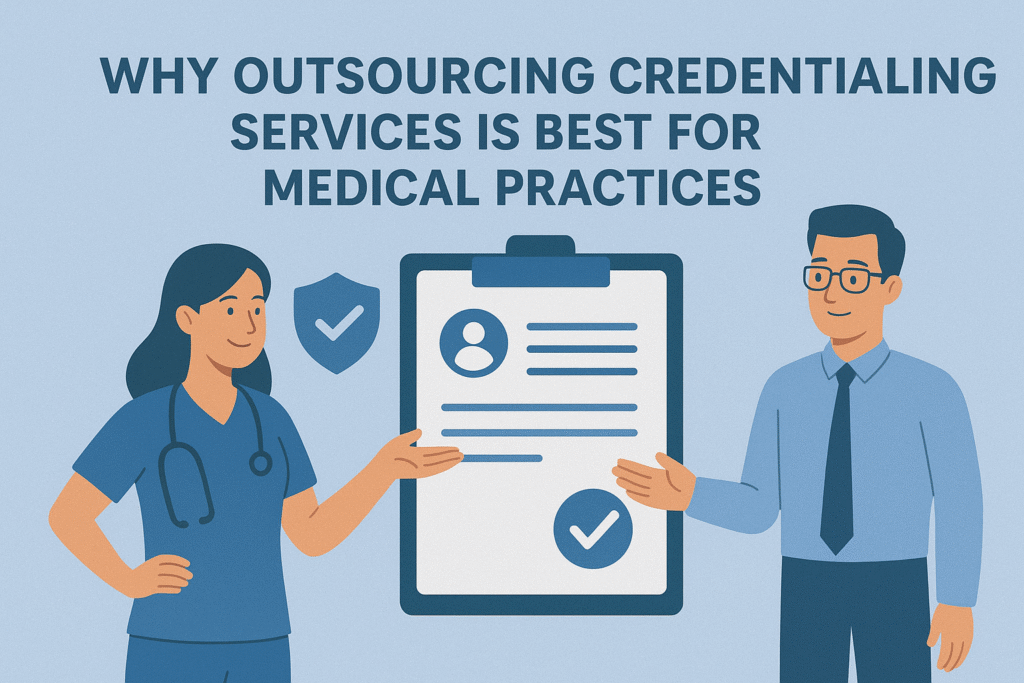In today’s complex healthcare environment, medical practices face increasing administrative challenges from insurance verification and coding compliance to patient data management. One of the most time-consuming yet essential processes in this mix is provider credentialing. Ensuring every physician, nurse, and allied health professional is properly credentialed with payers and facilities is crucial for compliance and timely reimbursement.
Yet, many practices underestimate how resource-intensive this process can be. That’s why more healthcare organizations are turning to outsourced credentialing services as an efficient, cost-effective way to ensure accuracy, reduce delays, and free up staff for more revenue-generating tasks.
Understanding the Credentialing Services
Credentialing is far more than just filling out forms. It involves verifying a provider’s qualifications, education, work history, certifications, malpractice history, and references before they are approved by insurance networks or hospitals.
This process ensures patient safety and helps maintain compliance with both federal and payer-specific regulations.
However, credentialing also requires deep attention to detail and constant follow-up. Missing a single document or deadline can result in significant revenue delays and even prevent providers from seeing patients under certain insurance plans.
The Hidden Cost of In-House Credentialing
For many small and mid-sized practices, credentialing is handled by office staff who already juggle multiple roles scheduling, billing, and administrative duties. As a result, credentialing tasks often get delayed or performed incorrectly.
When mistakes happen, the practice suffers from delayed payments, claim denials, and wasted hours on back-and-forth communication with payers.
Additionally, maintaining an in-house credentialing team means covering salaries, training, and software costs — all for a process that doesn’t directly generate revenue. The return on investment (ROI) often doesn’t justify the expense.
Why Outsourcing Makes Sense
Outsourcing credentialing services provides access to experienced specialists who understand every nuance of payer requirements and healthcare regulations. These professionals manage the entire process from application preparation to follow-ups, ensuring every credentialing file is complete, compliant, and processed quickly.
Here are some of the top reasons outsourcing makes business sense:
1. Speed and Accuracy
Credentialing experts work with multiple payers daily and know exactly how to navigate their systems efficiently. Their familiarity with documentation requirements helps minimize errors and shorten approval timelines.
2. Cost Efficiency
Outsourcing eliminates the need for dedicated full-time staff, saving on salaries, benefits, and technology expenses. Practices only pay for the services they need, which is far more cost-effective.
3. Reduced Administrative Burden
Delegating credentialing tasks frees up your internal team to focus on patient care, billing accuracy, and practice growth instead of drowning in paperwork and follow-ups.
4. Compliance Confidence
Credentialing specialists stay updated with the latest payer rules, accreditation standards, and healthcare regulations. This ensures your practice stays compliant and avoids costly credentialing errors that could disrupt reimbursement.
5. Ongoing Maintenance
Credentialing isn’t a one-time process; it’s continuous. Outsourced partners track re-credentialing dates, license renewals, and insurance updates, preventing lapses that could halt payment flow.
The Impact on Revenue Cycle Management
Efficient credentialing plays a direct role in Revenue Cycle Management (RCM). Delays in credentialing often mean providers can’t bill for services rendered, leading to stalled cash flow and operational strain.
By outsourcing, medical practices can ensure that all providers are properly enrolled and authorized to bill from day one. This smooths out the entire revenue cycle and helps maintain predictable, steady cash flow.
Additionally, outsourced credentialing partners often integrate seamlessly with RCM systems — ensuring that enrollment and billing data are synchronized, reducing the chance of claim denials or payment delays.
Choosing the Right Credentialing Partner
When selecting a credentialing partner, medical practices should prioritize experience, transparency, and technology. Look for companies that offer:
- Real-time application tracking
- Transparent reporting and progress updates
- HIPAA-compliant data handling
- Integration with your existing billing or EHR software
Partnering with a reliable credentialing provider can give your practice peace of mind, knowing that your providers are credentialed correctly and your revenue cycle remains uninterrupted.
Streamlining Your Operations with Professional Support
Credentialing may not be the most glamorous part of running a medical practice, but it’s one of the most crucial. Outsourcing this service is no longer just an operational choice; it’s a strategic move toward greater efficiency, compliance, and profitability.
If your practice is struggling with payer enrollment backlogs or provider approval delays, consider partnering with a professional credentialing and billing team. With the right expertise and technology, you can focus on what truly matters: delivering quality patient care while ensuring your financial operations run smoothly. For more such information, keep following regic to stay updated.



